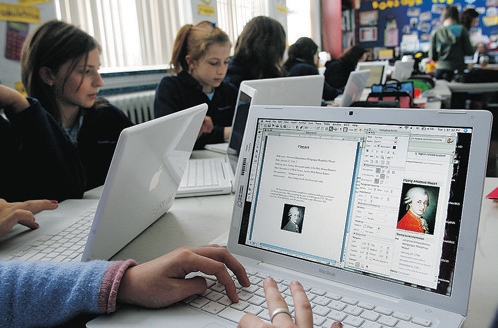Recente nieuwsberichten
WiFi kan geboorte-afwijkingen veroorzaken volgens Britse wetenschapper
- Gegevens
- Geschreven: woensdag 01 september 2010 08:02

OTTAWA — A British scientist and former naval weapons expert has waded into the debate over the safety of wireless networks in Canadian schools, warning generations could face genetic disorders because of prolonged exposure to low-level microwaves.
Barrie Trower, who specialized in microwave "stealth" warfare during the Cold War, was to lecture at the University of Toronto Tuesday night. His topic: safety concerns surrounding use of Wi-Fi systems in public schools.
While Health Canada maintains it is safe, Trower said there are no scientific studies that categorically state there is no harm from prolonged exposure. He also warns we could be threatening the health of future generations of Canadians who can be affected by microwaves at the DNA level.
"When I realized these same frequencies and powers (as weapons during the Cold War) were being used as Wi-Fi in schools, I decided to come out of retirement and travel around the world free of charge and explain exactly what the problem is going to be in the future," Trower told Postmedia News in an interview Tuesday.
"Children are not small adults, they are underdeveloped adults, so there are different symptoms.
"What you are doing in schools is transmitting at low levels," said Trower, who teaches at Britain's Dartmoor College and holds a degree in physics.
Trower said he's concerned about Wi-Fi in schools because "low level microwaves can damage the ovaries in girls."
"That girl could have a genetically deformed child, and that could be carried through generations. You are not just risking the current health of your children, you are risking the future generations of your children in your country with genetic disorders."
Health Canada issued a statement last week that said there is no health threat.
"Based on scientific evidence, Health Canada has determined that exposure to low-level radio-frequency energy, such as that from Wi-Fi systems, is not dangerous to the public," said a statement from the federal agency.
Health Canada said Tuesday it based its conclusion on reviews of studies from around the world and is satisfied there is more than enough evidence to support their view that it is safe.
"Using data from these studies, Health Canada set the general public exposure limits significantly lower than the threshold for any potentially adverse health effects," department spokesman Stephane Shank wrote in an e-mail.
"Health Canada's exposure guidelines for RF (radio frequency) energy are similar to, or more restrictive than, similar health-based international exposure standards. As long as exposures respect these guidelines, Health Canada has determined that there is no scientific reason to consider Wi-Fi dangerous to the public."
"The specified limits for public exposure apply to everyone — including the elderly, individuals with health concerns, children and pregnant women and allow for continuous, 24/7 exposure," Shank wrote.
Trower disagrees and maintains parents should make the schools sign off legally in case there are any health problems in the future.
"Parents should have a document from the school saying they take full legal responsibility for any damage caused by Wi-Fi. If they won't give that, the first question should be 'Why?' "
In Ontario, the debate has gone on since February in Simcoe County, near Toronto. Worldwide, the debate dates back more than a decade.
Last week, the Simcoe school board said it has no plans to remove wireless Internet from its elementary and high schools based on concerns from parents that it may be making students sick.
"We don't put children at risk, but we can't just shut it down and affect the learning of 50,000 students because someone says it might have health effects," John Dance, superintendent of education with the Simcoe County School Board, told Postmedia News at the time.
Simcoe County Safety School Committee member Rodney Palmer equated it to some pesticides, which were once thought to be harmless at any level, but whose use was later curtailed after studies showed any exposure could cause health problems.
"No amount is safe," Palmer said Tuesday.
His group paid the travel expenses for Trower's trip to Toronto, but Trower said he receives no payments and accepts no gifts to maintain his independence.
Other academics differ on whether prolonged exposure to the wireless technology is safe.
Tony Muc, a University of Toronto physics professor, was consulted by the school board and told them that wireless poses no harm.
But Trower's contention about health risks was echoed last week by Magda Havas, a professor in the Centre for Health Studies at Trent University in Peterborough, Ont. She said other forms of microwave exposure — particularly cellphone towers — have been linked to cancers, heart problems, sleeping problems, skin conditions and short-term memory loss.
Children are also more likely to be vulnerable, due to weaker immune systems and because their bodies are still growing.
"It is possible, and I think it is even probable, that this exposure will have an effect on children," Havas said

